Sugarproofing Your Baby with Michael I. Goran, PhD
- What an added sugar is and the difference between added sugars and naturally occurring sugars such as those in fruit or in dairy products
- Potential drawbacks that parents or caregivers may experience when babies consume added sugars
- Ways to substitute added sugars in recipes to be able to offer to babies and children
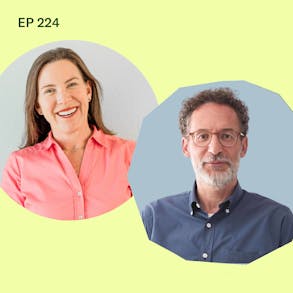
LISTEN TO THIS EPISODE
Episode Description
How much sugar is OK for my baby? According to the current dietary guidelines, it is recommended to avoid any added sugars for babies zero to twenty-four months old. To get a better understanding of why these recommendations are given, I am interviewing, professor, director and co-author Dr. Michael I. Goran, PhD who will be touching on the downsides of added sugars in baby food during the developmental stages. Dr. Goran will be providing some tips on how to SUGARPROOF your baby by offering natural sugars in place of added sugars.
About the Guest
- Michael I. Goran, PhD is a Professor of Pediatrics at The Children’s Hospital of Los Angeles, which is affiliated with the Keck School of Medicine at the University of Southern California. Dr Goran also serves as Co-Director of the USC Diabetes and Obesity Research Institute.
- Dr. Goran’s research has focused on the causes and consequences of childhood obesity for 30 years.
- He is the co-author of “Sugarproof: The Hidden Dangers of Sugar That Are Putting Your Child’s Health at Risk and What You Can Do” which aims to teach parents to raise informed and empowered kids who can set their own healthy limits without feeling restricted.

Links from this Episode
- @sugarproofkids
- Amazon: Sugarproof: The Hidden Dangers of Sugar That Are Putting Your Child’s Health at Risk and WHat You Can Do Book in all formats: hardcover/paperback/audio/kindle
- Sugarproofkids.com where you can get recipes for kids with less sugar.
- Baby-Led Weaning with Katie Ferraro program with the 100 First Foods™ Daily Meal Plan, join here: https://babyledweaning.co/program
- Baby-Led Weaning for Beginners free online workshop with 100 First Foods™ list to all attendees, register here: https://babyledweaning.co/baby-led-weaning-for-beginners

Latest Episodes

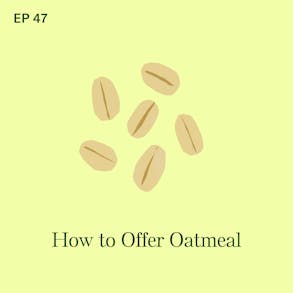

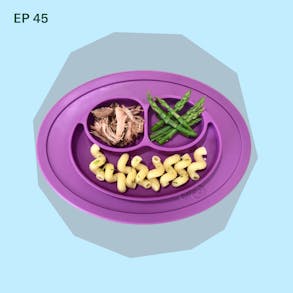
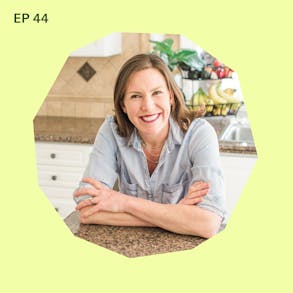
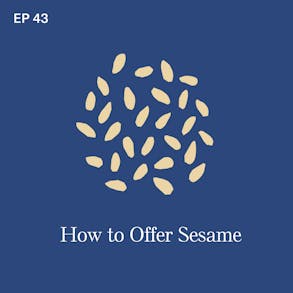
Michael Goran (1s):
But food manufacturers might add sugars or sweeteners to the yogurt, such as fructose itself, or sucrose or concentrated fruit puree to make the yogurt sweeter.
Katie Ferraro (14s):
Hey there I'm Katie Ferraro Registered Dietitian college nutrition professor and mom of seven specializing in baby led weaning here on the baby-Led Weaning Made Easy Podcast. I help you strip out all of the noise and nonsense about feeding, leaving you with the competence and knowledge you need to give your baby a safe start to solid foods using baby Led Weaning. Alright, fess up. Does the thought of your baby having a bite a cake at their first birthday party, make you smile or stress you out? There's two totally different reactions to the cake at the first birthday thing, people always write to me like Katie, do you have a recipe for no added sugar, gluten free, fruit-based smash cake?
Katie Ferraro (58s):
And I'm like, no, in my family, we eat real cakes. So on the baby's birthday, if they want to have real cake, I'm fine with that. Other families are like, Nope, not at all. I don't want to baby stab any added sugar to your prerogative to offer your baby the foods that you want. But I wanted to explore this idea of added sugars for baby. A little bit more in depth. So today's guest is Dr. Michael Goran. He's a professor of pediatrics at children's hospital, Los Angeles, and the Keck school of medicine at the University of Southern California. He's also the author of the book. Sugarproofing protect your family from the hidden dangers of excess sugar with simple everyday fixes. So I know that there are a lot of hidden sugars out there, particularly in commercial baby foods and not shaming any parents who rely on these foods for convenience from time to time.
Katie Ferraro (1m 43s):
However, there are added sugars in them, and we know that babies benefit when they're not exposed to added sugar. So I wanted to ask Dr. Goran a few questions about his findings, because he's done a ton of research in the field of pediatric nutrition and in particular sugar research. And again, his book is called Sugarproofing he is on social @sugarproofkids. His website is Sugarproofing kids. And so with no further ado, I want to introduce you to Dr. Michael Goran, PhD, author of the book. Sugarproofing Your Baby.
Michael Goran (2m 18s):
Lovely to see you, Katie. Thanks for having us on.
Katie Ferraro (2m 20s):
All right. Before we dive in talking about sugar, could you tell us a little about your professional background, the work you do, and then what inspired you to get into this unique part of nutrition science?
Michael Goran (2m 31s):
Yeah, I'm a professor of pediatrics and professor of population and public health sciences at USC and children's hospital, Los Angeles. And I've been doing research in childhood nutrition for 35 years. That's been kind of my career. That's what I do. And I've just always been interested in what kids eat and how it's affecting their health and their wellbeing and their development. And over the years we've gotten, we've kind of followed the yellow brick road of the data from numerous studies over the years. And that path has led us towards sugar as being kind of a recurring factor that we kept finding in different studies that we found to be related to different aspects of childhood health.
Katie Ferraro (3m 13s):
So then what inspired you to write the book? Sugarproofing?
Michael Goran (3m 16s):
Yeah, so the research that we're finding was so important and it was a story that had to be told, we were finding very useful information and back to the matter is people don't read the research studies. Very few people read them and the people that read them, aren't the people that need the information. So the idea was to translate all this research and try and accelerate the process of getting their research out to people who need it, families, parents, everywhere. So that was really the motivation just to get the information out there as fast as possible, not wait 10 years for it to become more accessible.
Katie Ferraro (3m 53s):
Dr. Goran, most parents are familiar with the American academy of pediatrics recommendations to avoid added sugars before age two. But could you explain exactly what an added sugar is? And then how does that differ from naturally occurring sugars? We find in food,
Michael Goran (4m 8s):
By the way, that's a new recommendation when we wrote the book, that was the thing. So, but we, we certainly wrote about that in the book based on the research. So it was really nice to see that new recommendation come out last year. But what we're talking about just to be clear is added sugars. There's a little bit of kind of disagreement on that in terms of what constitutes added sugars. Essentially there sugars that are added to food does not include the natural sugars in fruit or in dairy. The point of contention though, is fruit juice. So fruit juice, according to the dietary guidelines is not added sugars. And we highlight to count them as added sugars.
Michael Goran (4m 49s):
Really there other people call it free sugars because the sugars in juice are liberated from their natural form. So they're not being consumed in their natural form. So for me, added sugars is any sugars that are added to food, plus the sugars in juice, but not the sugars in whole fruit or dairy.
Katie Ferraro (5m 9s):
We've had Dr. Lustig on the podcast previously talking about the difference between juice and regular sugars. And I think parents are even sometimes confused because they hear fructose is a fruit sugar, and then they confuse that with high fructose corn syrup. So how are the highly processed sugars, different from a naturally occurring sugar like fructose
Michael Goran (5m 30s):
Consumed and fruit. There's never an issue. So that's why we say you should be eating fruit and not drinking fruit. I think most parents probably know about high fructose corn syrup, which is higher in fructose than regular sugar. But what if I told you that apple juice is even higher in fructose than high fructose corn syrup, it's not a processed sugar, it's a natural sugar, but when you liberate that sugar from the fruit about 70% of the sugars in apple juice is fructose, whereas 55% or 60% of sugars and high fructose corn syrup. So it's actually higher in fructose. And when sugars are high in fructose, they become more problematic because of the way that fructose is metabolized when it's consumed in high amounts.
Michael Goran (6m 20s):
And when it's consumed in liquid form, because of the way it's rapidly absorbed by the body and rapidly affects the liver, as opposed to eating a fruit lower fructose slowly released,
Katie Ferraro (6m 32s):
Because you're getting that beneficial offset from the presence of fiber, I would assume.
Michael Goran (6m 36s):
Yeah, you're getting the beneficial fibers. You're getting the beneficial phytonutrients with the fiber is doing also just because of the physical properties. Is it slowing down the release of the fructose because the fructose is kind of wrapped up inside the cell wall, you chew the apple. So it takes more of a tie. It's like a slow release capsule as opposed to a glass of apple juice, which is like a bolus. Those are, you might as well just be injecting it into the bloodstream
Katie Ferraro (7m 4s):
Now because there are no dietary guidelines for Americans published for Babies under 12 months of age, it frustrates parents kind of leaves them in the lurch about, well, what evidence-based guidelines for types of foods to feed and types of food to avoid are out there when we're making this transition to solid foods. I'm curious if you could explain to us some of the potential drawbacks that we would experience if we were to offer added sugars to babies, six to 12 months, what's the rationale for avoiding these
Michael Goran (7m 29s):
There's multiple aspects really about how added sugars in that age range? There's not a lot of studies because it's very hard to actually study that, but we have done some studies recently, for example, of looking at kids who were fed formula with added sugars at six months, showing how there's disruptions on gut microbiome, there's disruptions on appetite regulation
Katie Ferraro (7m 53s):
In your book. Sugarproofing you talk a lot about hidden sources of sugars. So what are some foods marketed to parents of infants that may contain these hidden sources of sugar? And I'm wondering if you could also speak maybe specifically to some of the yogurt products that are out there, because I think there's some of the most offensive foods, honestly, that are marketed directly to babies.
Michael Goran (8m 12s):
Yeah. And so yogurts is a good example because it's often marketed as a healthy food with healthy probiotics and other health benefits, calcium dairy and all that. But in yogurt, you have the natural sugars from the dairy, which is by the way, lactose. So lactose is a disaccharide of galactose and glucose that's naturally occurring in milk, including mother's milk and any kind of note product, but food manufacturers might add sugars or sweeteners to the yogurt such as fructose itself, or sucrose or concentrated fruit puree to make the yogurt sweeter.
Michael Goran (8m 54s):
That can be problematic because especially for young infants and children, because they actually prefer the taste babies are born with this built-in preference for sweetness, right? So they will want to eat more of that. The sweeter is the more they will want. And so it kind of tends to promote over consumption.
Katie Ferraro (9m 15s):
So what about artificial or non-nutritive sweeteners? These ingredients are typically found in adult diet foods that are inappropriate for Babies on a number of levels, but is there any level of artificial sweetener that's safer infants, as far as you're aware of from either your or other colleagues research?
Michael Goran (9m 31s):
I could talk all day about that topic. There's really not a lot of information on infancy consumption. I would avoid at all costs any type of alternative sweetener, synthetic or natural, certainly avoid all of the artificial sweeteners like sucralose and aspartame, though. Those should not be consumed. Oftentimes they're very hidden on food labels, but even the natural sweeteners, many parents think they might be healthier and safer such as Stevia and monk fruit. We just don't have any data on how they're effecting babies. So really look out for those and avoid them.
Michael Goran (10m 12s):
There's there's just no place for those sweeteners in the diets of young babies.
Katie Ferraro (10m 17s):
So for sweeteners, you know, obviously we're looking for other alternative sources of nutrition for Babies, but because there's no data about the safety of these as it kind of falls under the category of when in doubt, leave it out. Would you agree with that?
Michael Goran (10m 31s):
Absolutely.
Katie Ferraro (10m 31s):
And I wanted to ask you about something kind of along the line of Stevia or monk fruit. Curious about your thoughts regarding agave, because a lot of parents know, yeah, stay away from added sugars, but if they're adapting a recipe, let's say to make a baby led weaning muffin and the original recipe calls for molasses and added sugar would agave in very small quantities, be considered inappropriate substitute for the recipe.
Michael Goran (10m 53s):
I would try to avoid that agavei is very high in fructose. Most agaves are about 90% fructose and fructose is the sugar you want to avoid. So in all of our recipes in Sugarproof, we are using whole fruits as a sweetener. So you'd be better off using blended banana or a blended apple or some dates. That's the preferred approach because if you get the whole food and all the fiber and the taste of those whole foods, so that's the sweetener approach that I would recommend.
Katie Ferraro (11m 23s):
Now, sometimes parents get concerned when a family member like a grandma's slips, baby, a taste of ice cream or a bite of cake, there was just a big story in the news this week, a mom went ballistic because grandma gave the baby some added sugars,and in your real life opinion. I mean, I know you have your researcher side and your pediatric educator side, but like at a birthday party, if a baby is exposed to a bite of cake in a celebratory situation, is it something that parents really need to stress about? If it's in very small quantities and infrequently offered?
Michael Goran (11m 49s):
I don't think so. I think there's a real danger of those types of things. Backfiring. We don't want to put sugars and sweeteners on a pedestal. And you know, in a lot of situations, these things are kind of celebratory and culturally relevant and important for kids. So I think one off situation like that, not a big deal. I think what we got to look out for is the kind of longer term continuous, overwhelming consumption frequently, multiple times a day. And so on. So most small bites here, they're not a big deal. Sugarproof is not suggesting complete abolition of sugars and sweet treats from kids.
Michael Goran (12m 30s):
We think that there's ways that we can live with it. I think what we're concerned about is just the overwhelming amount that's available to kids today.
Katie Ferraro (12m 40s):
So many of the commercial baby food options available to parents are surprisingly, or maybe not surprising, there's just reiterations of fruit juice or apple or pear concentrate. It's kind of masquerading as a green smoothie or a kale pouch. And I just wanted to know your thoughts about this trend of masking vegetables in commercial baby foods, with sweet fruit flavors.
Michael Goran (13m 1s):
Yeah. I think it's problematic. And I think we have these, all these, the fruit snacks that are no
Katie Ferraro (13m 8s):
Actual fruit,
Michael Goran (13m 9s):
No actual fruit. Exactly. So, yeah, I think it's food companies trying to make money and we need to get back to whole foods and moving away from processed foods. These are all like probably highly processed products with goodness knows what ingredients in there. So I think the more we can do to avoid those types of processed foods and stick with whole foods is going to be much better because oftentimes those things come along. They may have little bits of fruit in them, but they're highly processed. They probably have other additives and chemicals in there that aren't going to be good.
Katie Ferraro (13m 44s):
So your book, sugar proof, unmasks myths about the various types of sugars and sweeteners that are added to foods. Could you just share real high level? What are some of those myths that we might not be aware of, but that are around us everywhere in our food environment today?
Michael Goran (13m 58s):
Yeah. Well, one of them is that, you know, I think a lot of parents are just thinking that the problem of sugar is just to do with weight gain and that's what they're looking out for. But what we're talking about is a whole host of other issues that sugar may be contributing to beyond weight gain. And that could be issues to do with brain development and learning ability, ability to concentrate in class a long-term risk for things. The chronic diseases of adults would like diabetes and heart disease and fatty liver, which may not emerge in childhood, but they're long lasting. So the method is really that it's not just about weight gain related to sugar.
Michael Goran (14m 39s):
There's a whole host of other issues affecting almost every part of the developing body. That's one. The second, the other one is that there's this belief that in a scientific literature says that sugar does not cause hyperactivity for example, but I think most parents would disagree with that. And when we took a deeper dive into it, we would not agree with that kind of common scientific belief. In fact, sugar does cause hyperactivity. It's just that we have done a lot of really good research studies on about, I don't think we need those studies because parents see it every day with our kids over consume on sugar.
Michael Goran (15m 21s):
And there's often hyperactivity followed by sugar crashes.
Katie Ferraro (15m 25s):
Your book Sugarproofing focuses on realistic family-based solutions to reduce sugar consumption to a healthy level. Can you share some tips for parents who would want to learn more about how they can reduce sugar consumption in order to protect their babies?
Michael Goran (15m 38s):
Yeah, well, I think there's different levels of that. So look out for the hidden sugars on products. Like we talked about already with the yogurts and even, you know, baby foods and a lot of products designed specifically for toddlers and kids who are weaning have a lot of added sugars in them and really should watch out for those. And what you do at home can make a big difference. There's small things you can do juice for example, should really be reduced. You can dilute juice at home to reduce the sugar quite significantly because most commercial juices are just way too sweet. So you can actually save money that way by diluting it.
Michael Goran (16m 17s):
And you can, you don't have to put syrup on pancakes or syrup on French toast. There's other ways you can make those types of foods more just as appealing and more nutritious to kids with what you put on it. Or if you're baking at home, something for your baby, just use less sugar, most recipes call for too much. So you can easily easily cut back the sugar by 25 to 30% and you'll still have a delicious end product. So that's a very simple tip right there.
Katie Ferraro (16m 49s):
Dr. Goran, where can we go to learn more about your work and get your book and more of the research behind this Sugarproofing approach for families?
Michael Goran (16m 56s):
Yeah. You can follow us on Instagram or Facebook with the tag @Sugarproofkids. The book is available anywhere that you're getting books. And it's also available in all formats, hardback, paperback, audio, and Kindle. The website is Sugarproofingkids.com where we have producing new recipes. There's 39 recipes in the book, but we have a lot more on a website. And then there are recipes really are taking family classic kid classic kids' favorite recipes, and just trying to reinvent them, but without the sugar,
Katie Ferraro (17m 29s):
Thank you so much for your time. I really appreciate it. And I will link to all of the resources that you mentioned, including your book on the show notes page for this episode, which is@blwpodcast.com.
Michael Goran (17m 39s):
Great, thank you so much.
Katie Ferraro (17m 41s):
Well, I hope you guys enjoyed that interview with Dr. Michael Goran. He's the author of the book. Sugarproofing again on social @Sugarproofkids, online shatterproof kids.com. And I will link to some of the other resources that Dr. Goran mentioned in today's interview on the show notes page for this episode, which you can find at blwpodcast.com forward slash 224. Thanks so much for listening guys. See you next time.

The Program Baby-Led Weaning with Katie Ferraro
A step-by-step digital program for starting solid foods safely and navigating the original 100 FIRST FOODS™ meal plan with baby-led weaning.
 EXPERT-LED, PROVEN APPROACH TO EATING REAL FOOD
EXPERT-LED, PROVEN APPROACH TO EATING REAL FOOD CONCISE VIDEO TRAININGS TO MASTER BABY-LED WEANING
CONCISE VIDEO TRAININGS TO MASTER BABY-LED WEANING 100 FIRST FOODS DAILY MEAL PLAN WITH FOOD PREP VIDEOS
100 FIRST FOODS DAILY MEAL PLAN WITH FOOD PREP VIDEOS
Baby-Led Weaning for Beginners Free Workshop
Is your baby ready to start solid foods, but you’re not sure where to start? Get ready to give your baby a solid foundation to a lifetime of loving real food…even if you’re feeling overwhelmed or confused about this next stage of infant feeding.
Get baby-led weaning recipes and tips delivered to your email inbox.


